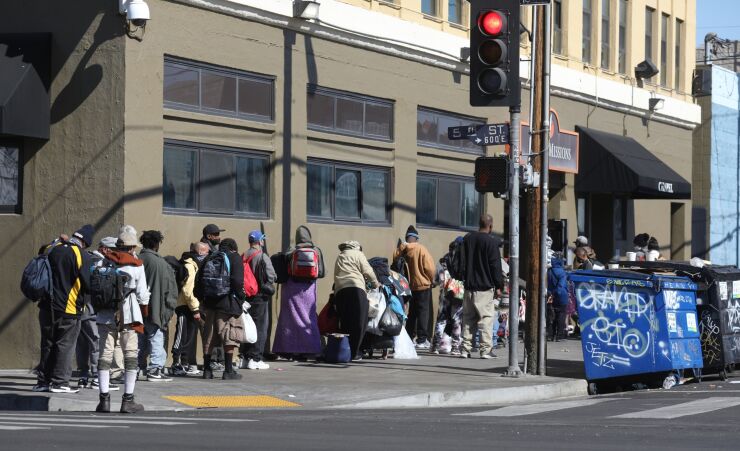California heads to market next week with the final offering in a bond program that funds supportive housing projects for mentally-ill homeless people.
Leading a 16-bank syndicate, bookrunners Raymond James and RBC Capital Markets will price the remaining bond authority Tuesday for the California Health Facilities Financing Authority, a state treasurer’s conduit, in a $1.05 billion taxable revenue bond deal.
The No Place Like Home program, created in 2016 legislation, provides funding to cities and counties for supportive housing projects. Bonds are repaid with revenue from the Mental Health Services Act, a measure approved by voters in 2004 that levies a 1% tax on personal income over $1 million to be used for mental health programs.

The state is tapping the remaining authorization now to ensure the California Department of Housing and Community Development, which runs the program, has enough funding available for the next round of awards, said Tim Schaefer, California's deputy treasurer for public finance.
The proceeds from the prior No Place Like Home bond issues are expected to be depleted and disbursed by this fall, Schaefer said. In addition to the $500 million
Coverage of the bond payments was about 18 times what was needed in the last fiscal year, Schaefer said. The legislation allows the state to tap $140 million annually from that taxing program.
The number of people subject to the millionaires’ tax has also more than tripled since 2009, according to the online investor presentation for the deal.
“In 2009, there were about 55,668 taxpayers subject to Proposition 63, but by this calendar year the number had grown to 186,000,” Schaefer said. “One of the things driving that is the tax is not subject to inflation and as income inflates more Californians are subject to the tax.”
The bonds are labeled “social,” but the state isn’t anticipating any pricing advantage.
“This is an evolving part of the market,” Schaefer said. “I anticipate at some point the market will begin to differentiate pricing on these things, but it will probably be a gradual process over a number of years.”
He said the state has seen a broader investor pool for bonds labeled ESG, but doesn’t have any data around it. It’s hard to tease out because a mutual fund that buys $300 million in bonds could be buying for a dozen of its funds, only one of which is ESG, he said.
The bonds received affirmed ratings of Aa3 from Moody’s Investors Service and AA-minus from Fitch Ratings and S&P Global Ratings.
Montague DeRose and Associates is financial advisor. Orrick Herrington & Sutcliffe is bond counsel.
The No Place Like Home program, received The Bond Buyer's
Though the program will be exhausted after the upcoming sale, the state has three other programs that provide funding for affordable and supportive housing.
The Veterans Housing and Homelessness Prevention Program provides loans to public or private entities to develop multifamily affordable rental housing, permanent supportive housing and transitional housing for veterans and their families. At least 25% of the funding in that program is dedicated to veterans experiencing homelessness. The state has awarded $482.4 million of the $600 million in that program to help fund 89 projects providing 5,335 units.
The state has awarded $759.7 million out of the $1.5 billion Proposition 1 multifamily housing program voters approved in a $4 billion 2018 general obligation bond measure. The funding already awarded supports 65 projects involving 4,956 units. Of that total, 1,012 units are restricted to homeless and other special needs populations.
HCD also administers the Homekey Program, a $2.2 billion program that provides grants for the purchase of motels and other types of housing to increase housing supply. Homekey, which is not a bond program, awarded $797 million in fiscal year 2020-21 to 51 local jurisdictions to purchase 120 projects to provide 5,911 permanent housing units. The state used money from two COVID-19 federal relief programs and the general fund to create the fund.
More than 160,000 people in California were unsheltered as January 2020, according
Including what is proposed in the 2022-23 budget, the state has
“In the fiscal year we are in now, the Legislature has authorized another $1.4 billion to another 23 projects, which add permanent housing units,” Schaefer said.





